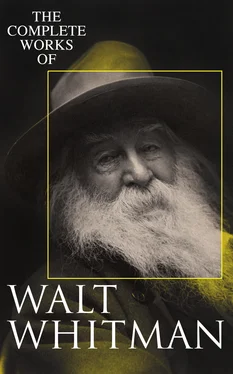The direct trial of him who would be the greatest poet is today. If he does not flood himself with the immediate age as with vast oceanic tides... and if he does not attract his own land body and soul to himself and hang on its neck with incomparable love and plunge his semitic muscle into its merits and demerits... and if he be not himself the age transfigured... and if to him is not opened the eternity which gives similitude to all periods and locations and processes and animate and inanimate forms, and which is the bond of time, and rises up from its inconceivable vagueness and infiniteness in the swimming shape of today, and is held by the ductile anchors of life, and makes the present spot the passage from what was to what shall be, and commits itself to the representation of this wave of an hour and this one of the sixty beautiful children of the wave — let him merge in the general run and wait his development.... Still the final test of poems or any character or work remains. The prescient poet projects himself centuries ahead and judges performer or performance after the changes of time. Does it live through them? Does it still hold on untired? Will the same style and the direction of genius to similar points be satisfactory now? Has no new discovery in science or arrival at superior planes of thought and judgment and behaviour fixed him or his so that either can be looked down upon? Have the marches of tens and hundreds and thousands of years made willing detours to the right hand and the left hand for his sake? Is he beloved long and long after he is buried? Does the young man think often of him? and the young woman think often of him? and do the middleaged and the old think of him?
A great poem is for ages and ages in common and for all degrees and complexions and all departments and sects and for a woman as much as a man and a man as much as a woman. A great poem is no finish to a man or woman but rather a beginning. Has any one fancied he could sit at last under some due authority and rest satisfied with explanations and realize and be content and full? To no such terminus does the greatest poet bring... he brings neither cessation or sheltered fatness and ease. The touch of him tells in action. Whom he takes he takes with firm sure grasp into live regions previously unattained... thenceforward is no rest... they see the space and ineffable sheen that turn the old spots and lights into dead vacuums. The companion of him beholds the birth and progress of stars and learns one of the meanings. Now there shall be a man cohered out of tumult and chaos... the elder encourages the younger and shows him how... they two shall launch off fearlessly together till the new world fits an orbit for itself and looks unabashed on the lesser orbits of the stars and sweeps through the ceaseless rings and shall never be quiet again.
There will soon be no more priests. Their work is done. They may wait awhile... perhaps a generation or two... dropping off by degrees. A superior breed shall take their place... the gangs of kosmos and prophets en masse shall take their place. A new order shall arise and they shall be the priests of man, and every man shall be his own priest. The churches built under their umbrage shall be the churches of men and women. Through the divinity of themselves shall the kosmos and the new breed of poets be interpreters of men and women and of all events and things. They shall find their inspiration in real objects today, symptoms of the past and future.... They shall not deign to defend immortality or God or the perfection of things or liberty or the exquisite beauty and reality of the soul. They shall arise in America and be responded to from the remainder of the earth.
The English language befriends the grand American expression... it is brawny enough and limber and full enough. On the tough stock of a race who through all change of circumstance was never without the idea of political liberty, which is the animus of all liberty, it has attracted the terms of daintier and gayer and subtler and more elegant tongues. It is the powerful language of resistance... it is the dialect of common sense. It is the speech of the proud and melancholy races and of all who aspire. It is the chosen tongue to express growth faith self-esteem freedom justice equality friendliness amplitude prudence decision and courage. It is the medium that shall well nigh express the inexpressible.
No great literature nor any like style of behaviour or oratory or social intercourse or household arrangements or public institutions or the treatment by bosses of employed people, nor executive detail or detail of the army or navy, nor spirit of legislation or courts or police or tuition or architecture or songs or amusements or the costumes of young men, can long elude the jealous and passionate instinct of American standards. Whether or no the sign appears from the mouths of the people, it throbs a live interrogation in every freeman’s and freewoman’s heart after that which passes by or this built to remain. Is it uniform with my country? Are its disposals without ignominious distinctions? Is it for the evergrowing communes of brothers and lovers, large, well-united, proud beyond the old models, generous beyond all models? Is it something grown fresh out of the fields or drawn from the sea for use to me today here? know that what answers for me an American must answer for any individual or nation that serves for a part of my materials. Does this answer? or is it without reference to universal needs? or sprung of the needs of the less developed society of special ranks? or old needs of pleasure overlaid by modern science and forms? Does this acknowledge liberty with audible and absolute acknowledgement, and set slavery at nought for life and death? Will it help breed one goodshaped and wellhung man, and a woman to be his perfect and independent mate? Does it improve manners? Is it for the nursing of the young of the republic? Does it solve readily with the sweet milk of the nipples of the breasts of the mother of many children? Has it too the old ever-fresh forbearance and impartiality? Does it look with the same love on the last born and on those hardening toward stature, and on the errant, and on those who disdain all strength of assault outside of their own?
The poems distilled from other poems will probably pass away. The coward will surely pass away. The expectation of the vital and great can only be satisfied by the demeanor of the vital and great. The swarms of the polished deprecating and reflectors and the polite float off and leave no remembrance. America prepares with composure and goodwill for the visitors that have sent word. It is not intellect that is to be their warrant and welcome. The talented, the artist, the ingenious, the editor, the statesman, the erudite... they are not unappreciated... they fall in their place and do their work. The soul of the nation also does its work. No disguise can pass on it... no disguise can conceal from it. It rejects none, it permits all. Only toward as good as itself and toward the like of itself will it advance half-way. An individual is as superb as a nation when he has the qualities which make a superb nation. The soul of the largest and wealthiest and proudest nation may well go halfway to meet that of its poets. The signs are effectual. There is no fear of mistake. If the one is true the other is true. The proof of a poet is that his country absorbs him as affectionately as he has absorbed it.
Table of Contents
I celebrate myself,
And what I assume you shall assume,
For every atom belonging to me as good belongs to you.
I loafe and invite my soul,
I lean and loafe at my ease . . . . observing a spear of summer grass.
Houses and rooms are full of perfumes. . . . the shelves are crowded with perfumes,
Читать дальше












